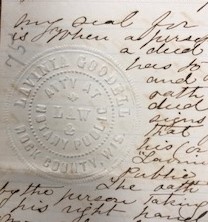“I received my commission as notary public.”
Lavinia Goodell, February 10, 1875
Since Lavinia Goodell was the first woman admitted to practice law in Wisconsin, it is likely that she was also the first woman in Wisconsin to receive a commission as a notary public. Lavinia’s first mention of serving as a notary appears in a February 10, 1875 letter that she wrote to her sister, Maria Frost:
I received, yesterday, my commission as notary public, from the Gov. So now I can administer the oath, acknowledge deeds, etc. The certificate expresses the Gov’s confidence in my “integrity & ability,” etc. & I had besides a note from his secretary, Mr. Bird (my opposing counsel on the Burrington suit) – read more about the Burrington case here – saying he was very happy to do it for me.
Maria must have inquired what was entailed in being a notary public because on March 24, 1875 Lavinia sent her a lengthy explanation and affixed an imprint of her notary seal to the letter.

You inquire what a notary is. Well a notary is a “magistrate,” authorized to administer oaths, acknowledge deeds, protest bills and notes, etc. They are considered “State officers,” have a seal, and hold the office for two years; are appointed by the Governor. I will make an impression of my seal for you. Here it is. When a person has executed a deed or mortgage he has to go before a notary and acknowledge under oath that it is his deed. Then the notary signs a certificate of that fact & attaches his (or her) seal. I sign “Lavinia Goodell, Notary Public, Rock County, Wis.” The oath is administered by the person taking it holding up his right hand & I say “You solemnly swear that this is your veritable deed,” (or state whatever fact they swear to) “so help you God.” U.S. pensioners have to be sworn once in 3 months, whenever they draw their money. They swear as to their identity & if widows, that they have not remarried, etc. Many of them come to me. I get 25 cents each.
Lavinia proudly mentioned her status as a notary in the advertisement she ran almost daily in the Janesville Gazette.

Later in 1875, when Lavinia filed her petition seeking admission to the Wisconsin Supreme Court bar, one of her arguments why the statute governing admission to the bar should be read to include women as well as men was the fact that the statute governing notaries had been given that interpretation:
[I]t is provided that “every word importing the masculine gender only may extend and be applied to females as well as to males.” Tay, Stats., 1 p. 181. This rule of interpretation is followed in the construction of all the statutes…. It has been so applied to the statute providing for notaries public, and defining their duties; under which your petitioner has been appointed and now holds the office of notary.
In 1877, the Wisconsin legislature changed the statute governing notaries to provide that notaries “shall be residents and qualified electors of the county for which they are appointed.” Women, of course, were not eligible to vote so were not “qualified electors.” In early 1878 Lavinia wrote to her cousin Sarah Thomas, “I drafted a new bill for the legislature … so as not to cut off women from being notaries public.” By March 1879, the statute had been amended again to state that notaries “shall be residents and qualified electors, or females of the age of twenty-one years or upwards, …” Following this statutory change, Lavinia wrote to Sarah, “At last I have got my notary commission & can lawfully swear for four years to come, which is very convenient.” And to Maria she wrote, “I got my notary bill passed and have received my commission, so am all right again in a business way.” When Lavinia commenced her short lived law practice in Madison in late 1879, the advertisement she ran in the Wisconsin State Journal again noted that she was a notary.

Sources consulted: Lavinia Goodell’s letters to Maria Frost (February 10, 1875; March 24, 1875; April 5, 1879; undated letter); Lavinia Goodell’s letters to Sarah Thomas (January 4, 1878; January 17, 1879; March 14, 1879); Janesville Gazette (March 19, 1875); Wisconsin State Journal (December 3, 1879); 1878 Statutes, Chapter XIII, Section 173 and amendments thereto.







